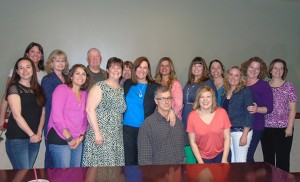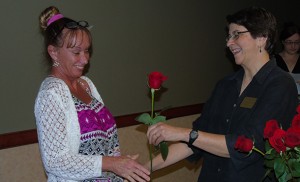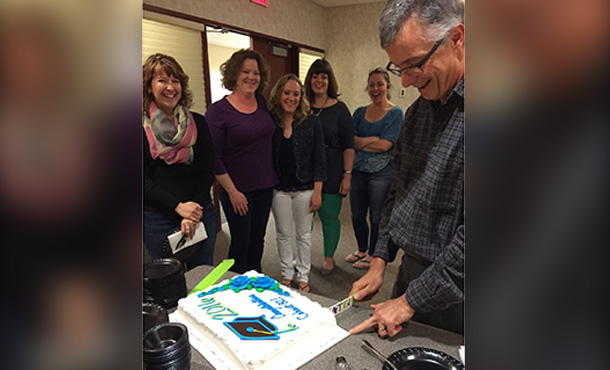Year after year, Keith McNeely watched his fellow nurses at Winchester Medical Center make the weekly 65-plus mile drive to Eastern Mennonite University (EMU) as they worked towards their bachelor of science in nursing (BSN) degree. McNeely, a nurse in the cardiovascular surgical intensive care unit, enrolled twice but, as he says, “life got in the way.”
Nearly 30 years after he earned his associate’s degree in nursing and with an equal number of years spent in the nursing profession, McNeely has met his goal. He celebrated with 19 fellow graduates in “Cohort 82” at a May 25 ceremony attended by family, friends, EMU faculty and staff, and hospital leadership.

McNeely’s success was partly due to the willingness of EMU nursing educators to provide an on-site education program at Winchester Medical Center that has helped both nurses and their employer meet professional development needs.
McNeely’s cohort, which started on-site at Winchester Medical Center in October 2014, was the first to complete the program.
His fellow graduates included nurses from across the Valley Health System network, which includes five other hospitals in addition to the flagship hospital in Winchester, three urgent care facilities, and 50 physician practices. The health system employs more than 5,300 people.
Meeting professional development needs
The nationwide push for making the bachelor’s degree the educational standard for a registered nurse comes as the profession grows increasingly more complex and demanding.
“By 2020, VHS aspires to have 80 percent of their nurses holding a bachelor’s degree, an initiative which the health system is supporting with scholarships, tuition assistance and textbook reimbursement,” says Lisa Zerull, VHS academic liaison. “This degree better prepares professional workforces to meet the demands of diverse populations across their lifespans.”
Several regional and online accredited academic programs offered by universities and community colleges are available to VHS employees. Each nurse chooses a degree completion program that matches personal learning needs, Zerull said.
EMU’s BSN completion program has been popular, with the largest number of graduates. In 2015, for example, 52 nurses earned their degrees at EMU. (The Harrisonburg campus RN-BSN program has been offered since 1988, and an online RN-BSN program is offered through EMU’s Lancaster campus).

The two-hour round-trip drive south, along with a four-hour midweek class, was a known deterrent. While hybrid and on-line options are available, Zerull says a 2012 VHS employee survey showed that many potential students preferred desired a traditional classroom option — what she calls ‘eyeballs, warm bodies and active dialogue for learning” — that was also on-site.
“Valley Health System approached several regional universities inviting them to offer a traditional BSN program on-site at Winchester Medical Center,”she said. “EMU agreed to bring the one-evening-a-week program to us in 2014.”
So far, interest continues to be promising: Two more cohorts are in progress, with one concluding in September 2016 and a second cohort in March of 2017. A fourth cohort begins in August.
Tailored curriculum to working professionals
The 18-month RN-BSN curriculum is specially tailored for working nurses, experienced professionals and adult learners, “quite different than an undergraduate BSN program,” said Jan Butcher, who coordinates and teaches in the program. “The curriculum develops nursing students broadly in terms of cultural perspective, global health, community health and nursing research — all topics that are not covered in an associate’s degree program.”
Butcher, a Berryville resident, has been a part-time instructor in the nursing program at EMU for 13 years.
Instead of clinical experiences, the students, research, create and implement an evidence-based practice project. The projects require the student to identify a patient care question or concern of interest, explore the literature, and then suggest best care practices supported by the evidence.
Supporting adult learners is a priority, says Margo McIntire, who worked with the nurses as an academic advisor in EMU’s Adult Degree Completion Program. “The cohorts are like intentional communities and the students pull each other through and learn a lot from each other.”
McNeely says one of the benefits was attending classes with co-workers that he didn’t know well, and finishing with “20 new friends that I will remember for the rest of my life.” Best of all, those 20 new friends are people he will continue to see and work with on a daily basis.
He’s become something of a salesman for the program. Both his daughter and son are currently working towards their BSN degrees at EMU through the on-site program at Winchester as well.
Group photo: Pictured are Catherine Selby, Terri Brewer, instructor Connie Wimer, Jamie Marshall, Jay Gilbert, Meridith Rudolph, Melissa McDonald, Terri Wright, vice president of nursing for Warren Memorial and Page Memorial hospitals and an instructor in the program, Keith McNeely, Sarah Siebert, LeAnn McDaniels, Kelly Sakai, Stacey Hevner, Amy Furcho, Becky Brill, Lisa Schlosser. Not present: Nancy Bolyard, Ashlyn Brown, Natasha Caplan, Shonta Curry, Natalie Long, and Monique Summers.
